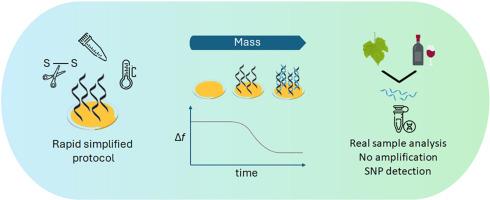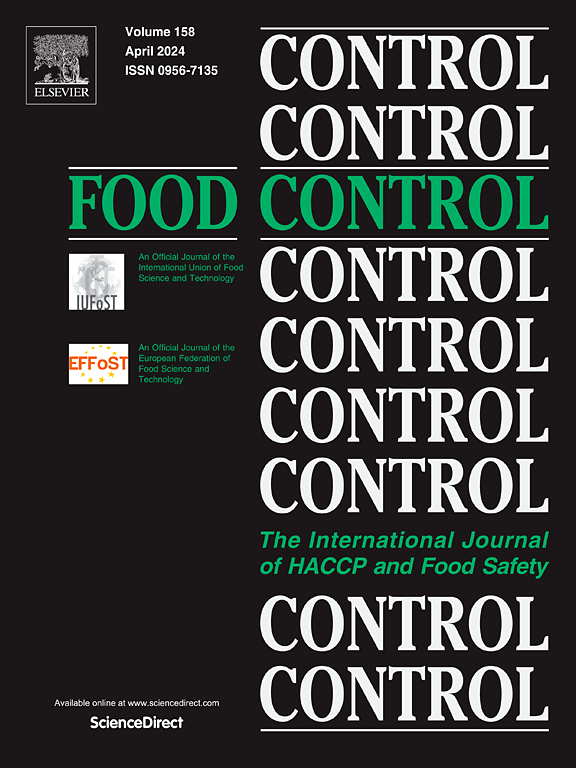Newly developed QCM-DNA biosensor for SNP detection in small DNA fragments: A wine authenticity case study
IF 5.6
1区 农林科学
Q1 FOOD SCIENCE & TECHNOLOGY
引用次数: 0
Abstract
We propose a QCM-DNA biosensor for single nucleotide polymorphism (SNP) detection in samples of differing complexity. An optimized protocol is presented, focusing on parameters affecting probe immobilization and hybridization efficiency. Our results led to the implementation of thiolated probe reduction with TCEP, followed by immobilization in PBS buffer containing MgCl2. The biosensor exhibited an enhanced specificity at 37 °C, achieving detection of single mismatches using synthetic targets. Using real samples, we applied the biosensor in a wine authenticity assessment context. The addition of dithiothreitol improved stability and reproducibility when testing wine DNA samples. The QCM-DNA biosensor was able to specifically detect complementary DNA in leaf and wine DNA samples, distinguishing between samples with two heterozygous mismatches. The biosensor solely depends on DNA extraction, basic instrumentation, and reagents, without requiring PCR or signal amplification strategies. Our findings show the biosensor potential for applications in wine authenticity assessment and other fields requiring complex analysis in undemanding settings.

用于检测小 DNA 片段中 SNP 的新开发 QCM-DNA 生物传感器:葡萄酒真实性案例研究
我们提出了一种 QCM-DNA 生物传感器,用于检测不同复杂性样本中的单核苷酸多态性 (SNP)。我们提出了一种优化方案,重点关注影响探针固定和杂交效率的参数。研究结果表明,使用 TCEP 还原硫醇探针,然后将其固定在含 MgCl2 的 PBS 缓冲液中。该生物传感器在 37 °C时表现出更强的特异性,可检测合成靶的单个错配。通过使用真实样品,我们将该生物传感器应用于葡萄酒的真实性评估。在检测葡萄酒 DNA 样品时,加入二硫苏糖醇提高了稳定性和可重复性。QCM-DNA 生物传感器能特异性检测叶片和葡萄酒 DNA 样品中的互补 DNA,并能区分两个杂合错配的样品。该生物传感器只需 DNA 提取、基本仪器和试剂,无需 PCR 或信号放大策略。我们的研究结果表明,该生物传感器有望应用于葡萄酒真伪评估和其他需要在要求不高的环境下进行复杂分析的领域。
本文章由计算机程序翻译,如有差异,请以英文原文为准。
求助全文
约1分钟内获得全文
求助全文
来源期刊

Food Control
工程技术-食品科技
CiteScore
12.20
自引率
6.70%
发文量
758
审稿时长
33 days
期刊介绍:
Food Control is an international journal that provides essential information for those involved in food safety and process control.
Food Control covers the below areas that relate to food process control or to food safety of human foods:
• Microbial food safety and antimicrobial systems
• Mycotoxins
• Hazard analysis, HACCP and food safety objectives
• Risk assessment, including microbial and chemical hazards
• Quality assurance
• Good manufacturing practices
• Food process systems design and control
• Food Packaging technology and materials in contact with foods
• Rapid methods of analysis and detection, including sensor technology
• Codes of practice, legislation and international harmonization
• Consumer issues
• Education, training and research needs.
The scope of Food Control is comprehensive and includes original research papers, authoritative reviews, short communications, comment articles that report on new developments in food control, and position papers.
 求助内容:
求助内容: 应助结果提醒方式:
应助结果提醒方式:


